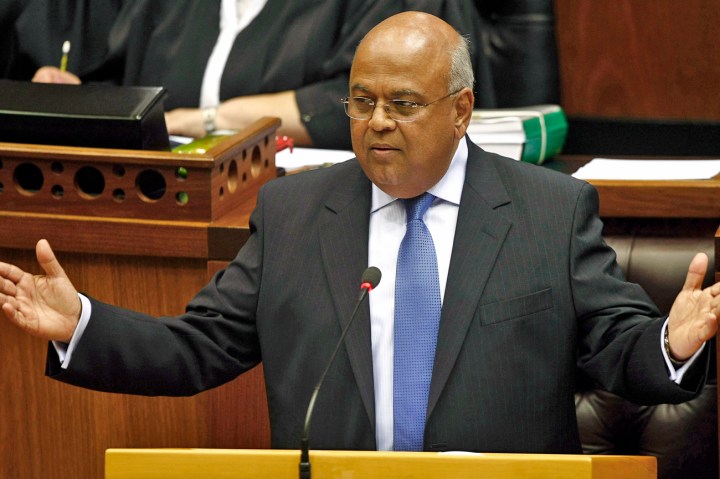Business Maverick, Politics
Analysis: Gordhan’s budget keeps the Gini in the bottle

The annual budget usually attracts a lot of praise and some condemnation. Finance minister Pravin Gordhan’s budget on Wednesday was no exception and, while it holds some intriguing promise, there are also large amounts of good money being thrown after bad. By STEPHEN GROOTES.
In a democracy with the world’s highest Gini coefficient, the measure of equality of wealth distribution, (as Cosatu keeps reminding us), being finance minister must suck. In a country with a capitalist business sector throwing up profits for a few while many suffer the indignity of unemployment, the pressure to just say the hell with it and radically redistribute must be strong. The economy, you’d think, would be the main point of contestation between “progressive” forces and the fat cats. So it’s something of a surprise that SA budgets nowadays could be best explained as bloody boring. The fact that a minister emanating from the SA Communist Party can produce a budget that business welcomes with open arms is nothing short of miraculous.
In recent times the budget has become far more important than the State of the Nation address. This isn’t a comment on respective speechmaking talents (or lack thereof), but rather of the fact that money matters more than anything else. And thus the distribution of government’s money is the ultimate expression of political power. But read Wednesday’s budget speech by finance minister Pravin Gordhan more carefully and you get a real sense of who is powerful and who is not.
Of course, some issues are just dead easy to expect. Health, education and crime are where we need to spend our money and spending in those sectors is going up substantially. Transport needs cash to fix roads, it’s getting some of it, but probably not enough. Bodies like the Competition Commission get a little more than they’ve had in the past to fund what looks like a busy period ahead.
There are also one or two issues Gordhan will deal with himself as a regulator. Bank charges is one of them. People believe they’re opaque; he agrees, and he’s going to do something about them. Then there’s Gordhan the captain of the economy and spending. He warned against a larger deficit, and has put more money away in a contingency fund. Gordhan also likes to look around and see what the future holds, that our economy will grow by 3.45 % this year, but hopefully by around 4.4% in 2013. Remember, though, that last year he said we need 7% to create the jobs we need.
Gordhan is at his most political with the announcement of the youth employment wage subsidy. It’s R5 billion in tax breaks for companies who employ younger first-time workers. It’s a good idea, it must be implemented, we applauded when it was suggested last year, we applaud again this year. The people who may not be applauding are at Cosatu House. They were furious with the idea last year and the same is the case now. Their reasoning is that if it’s made cheaper for companies to employ younger people, in the end every worker employed in those jobs by those companies will be on that lower wage, with older, experienced employees losing their jobs. It’s interesting logic. It’s really the creation of a playing field for another of those little intra-alliance spats we’ve grown so used to. We can’t wait to hear Zwelinzima Vavi say once again, “The alliance is strong”. But they are put in a corner by Gordhan, they’d look a little silly welcoming this budget wholeheartedly now.
While business is celebrating, there is one stern note of caution we feel we must ring. The fact that a budget speech is a political act means that politics determines some priorities and some of those priorities are simply wrong. It means that money follows the power and the policy, and not what works. It means that the State Employment Training Agencies (Setas) are getting R20 billion. That’s nearly $3 billion dollars, a humongous amount. Those would be the same Setas that just about everybody (except the odd minister) agrees have failed. The very same Setas that for the last 10 years have gobbled up billions of rands. And another great idea that became bogged down in the general sea of non-delivery? Talk about if-it’s-broke-don’t-fix-it. It is part of the definition of madness: We’ve thrown money at this before and it didn’t work, so we’ll just keep throwing more money at it.
But that’s nothing compared to what’s happening with our public sector workers. “The public sector wage bill has doubled over the last five years,” he warned, “from R156 billion to R314 billion.” That’s an incredible amount in a very short time. There is no way the value of the work done by public servants has doubled since 2006. And all indications are that bill will not go down very soon. The recent history of our strikes and the ANC’s unwillingness to say “no” to Cosatu in this area means we are in future going to continue paying exorbitantly for the public sector that delivers less every year. A bleak prospect, that one.
While Gordhan is going to be hailed as a hero from all sides, it must be remembered that he himself has used this speech to say that his budget will not succeed in its main aim, – creating jobs. He says it will create about 2% job growth. That translates to about 200,000 jobs, not half a million. There’s probably not much he can do about it, but it does not bode well for the job promise the President made at his State of the Nation speech. The reality checks don’t come much more painful than that. DM
Grootes is an EWN reporter.
Photo: Reuters.
















 Become an Insider
Become an Insider